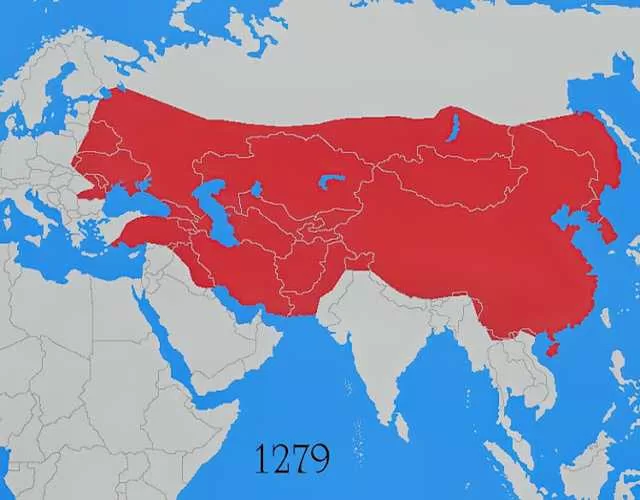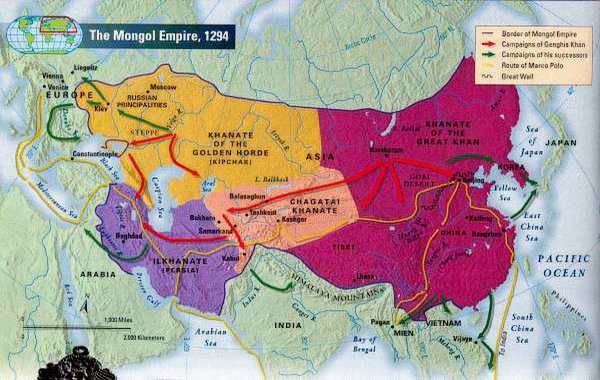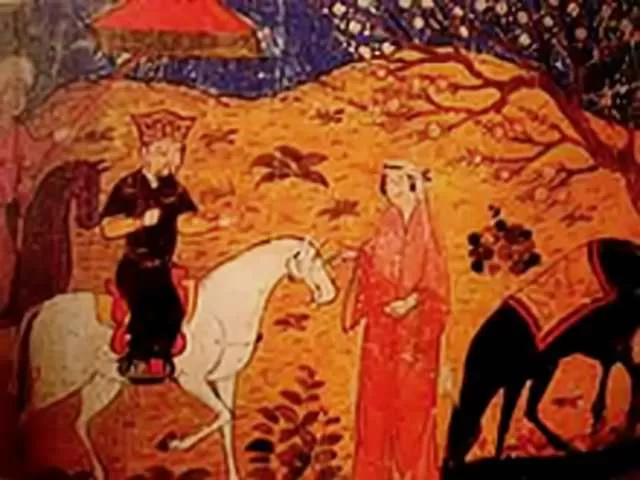Mahmud Ghazan was the most prominent leader of the Mongol Ilkhanate in Persia, reigning from 1295 to 1304. Born on November 5, 1271, in Abaskun, Iran, he was the son of ruler Arghūn and became viceroy of northeastern Persia in 1284. Ghazan is notable for converting from Buddhism to Islam before his accession to the throne, a move that helped solve the Ilkhanate’s religious and economic problems and made their rule more acceptable to their Muslim subjects. This conversion also marked a turning point for the dominant religion of the Mongols in West Asia.
During his reign, Ghazan fought against the Mamluk dynasty for control of Syria and engaged in military conflicts with the Chagatai Mongols. He was known for his cultural contributions, patronizing art, scholarship, and science, and for commissioning a comprehensive history of the Mongols. Ghazan’s policies promoted religious tolerance and cultural flourishing within the Ilkhanate. He passed away on May 11, 1304
The Ilkhanate
Mahmud Ghazan, the Ilkhanate, remains relatively unknown to many. Established by Genghis Khan’s grandson, the Ilkhanate encompassed vast regions including present-day Iran, Iraq, Armenia, Azerbaijan, Georgia, Turkmenistan, Turkey, and parts of Afghanistan and Pakistan. As a direct descendant of Genghis Khan, Ghazan inherited a legacy of power and authority.

The Mongol Empire shortly before the breakup, above. After the partitioning of the empire, below.
Multifaceted Leader
Born in 1271, Ghazan possessed a diverse set of skills and interests. Fluent in several languages, including Chinese, Arabic, Latin, and his native Mongolian, Ghazan demonstrated intellectual prowess uncommon among rulers of his time. Beyond his linguistic abilities, Ghazan indulged in various hobbies such as saddle making and metal smithing, showcasing his versatility and craftsmanship.
Diplomatic Endeavors
While Ghazan’s reign saw its share of warfare and political maneuvering, he displayed a unique inclination towards diplomacy. Despite seizing power by eliminating his cousin and engaging in military campaigns, Ghazan endeavored to foster religious tolerance and maintain alliances with neighboring Mongol khanates. Moreover, he sought to establish diplomatic ties with European powers, showcasing a progressive approach to international relations.
Reforms and Innovations
Ghazan’s legacy extends beyond diplomacy to encompass significant reforms and innovations. Introducing standardized coins and measures, constructing hostels, hospitals, and schools, Ghazan implemented policies aimed at societal betterment and progress. His efforts contributed to the modernization and development of the Ilkhanate, leaving a lasting imprint on its governance and infrastructure.

Religious Conversion
Despite his accomplishments in diplomacy and governance, Ghazan is best known for his conversion from Buddhism to Islam. Motivated by political expediency, Ghazan’s adoption of Islam transformed the religious landscape of the Ilkhanate, establishing Islam as the dominant faith among the Mongols in the region. This pivotal decision reshaped the cultural and religious dynamics of Ghazan’s realm, leaving a lasting legacy on future generations.
Intriguing Connections
Ghazan’s life intersects with several renowned historical figures, adding layers of complexity to his narrative. His principal wife, Kokochin, was a Mongol princess escorted to the Ilkhanate by none other than the legendary traveler Marco Polo. Through these connections, Ghazan’s story intertwines with the broader tapestry of Mongol history, offering insights into the complexities of medieval Eurasia.
Conclusion
Despite his relative obscurity in popular historical discourse, Ghazan emerges as a multifaceted ruler whose reign left a profound impact on the Ilkhanate and beyond. From diplomatic initiatives to religious conversions, Ghazan’s legacy continues to intrigue scholars and enthusiasts alike, shedding light on the intricate dynamics of Mongol rule in the medieval era. Delve into the captivating tale of Ghazan, a forgotten Mongol ruler whose influence reverberates through the annals of history.

